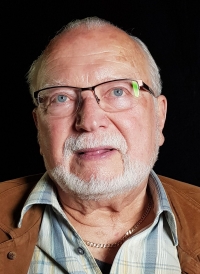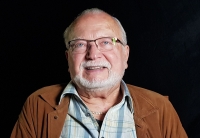I graduated from “Camp School”, but nobody compensated my missing school years after the expulsion

Stáhnout obrázek
Rudolf Lux was born on 14 March 1939 in Loučná nad Nisou (Lautschnei), Jablonec district, into the family of the butcher and innkeeper Rudolf and Elisabeth (née Fleischmann) Lux, from a glass-blower family. His father rented out the Modrý Dunaj (Blue Danube) inn in Loučná, which was close to a tram line, and also operated a small butcher’s. After completing his mandatory military duty with the Czechoslovak cavalry, he decided to desert rather than submit to the general mobilisation around the time of the Munich Agreement, something he was convicted for after the war. During the war the family business was run by the mother, their father fought in the USSR under the Wehrmacht and was seriously wounded. Little Rudolf witnessed the arrival of the Red Army and indirectly an attempt to rape his mother, in autumn he saw his father being arrested by the Czech authorities. Around Christmas of 1945 the rest of the family was forced to leave their home and were interned in camps in Rajnovice, Rychnov and later Liberec. The family spent almost three years in the Regional Concentration Centre in Liberec. There Rudolf attended a centre school (“Lagerschule” in German), where the adults in the camp tried to provide the children with some basic knowledge. The teachers of the school were also interned camp members, teaching only reading, writing and arithmetic in German. Today Mr Lux has problems with spelling and has a largely photographic reading style, missing basic knowledge from most school subjects, which is why he trained to be a butcher. The Lux family was deported to Bavaria at the end of 1948, after their father was released. In 1954 their father was able to start his own butcher’s, and his son Rudolf carried on with the family business, having lived all over Germany before returning to Bavaria. He married in Stuttgart and has one son. In 1961 he served in the Bundeswehr nearby the town of Regen, where he helped protect the NATO border with what was at the time the CSSR. Recently Rudolf has been regularly travelling to Bohemia and still feels at home in the Jizera Mountains.

